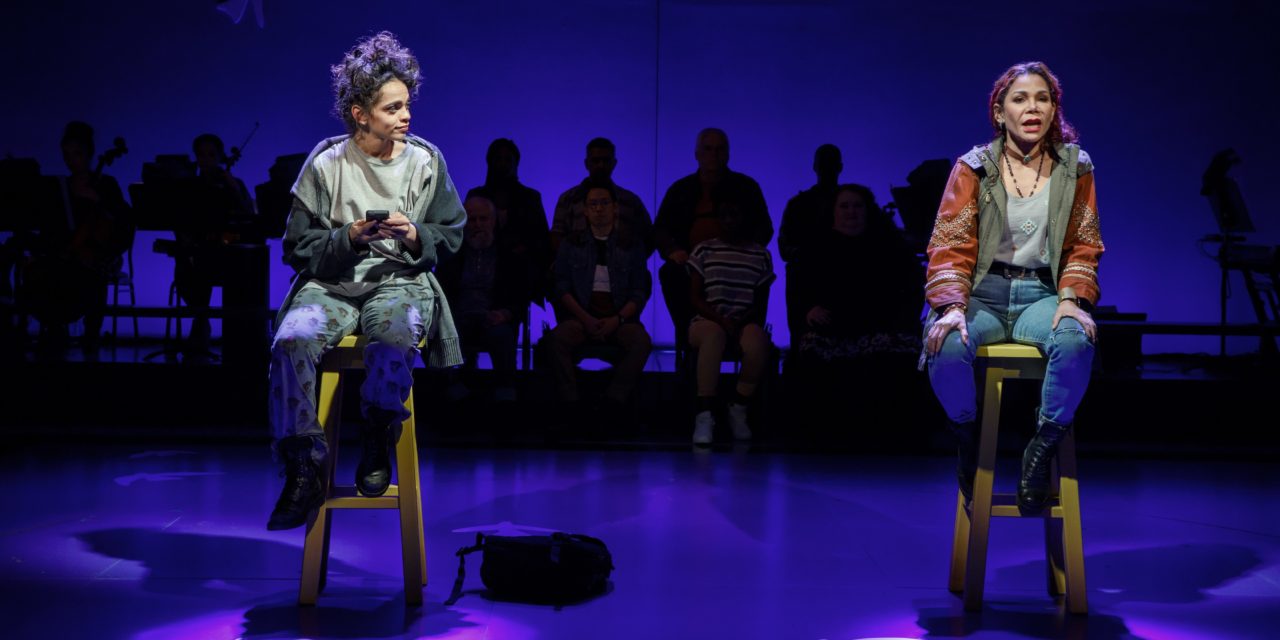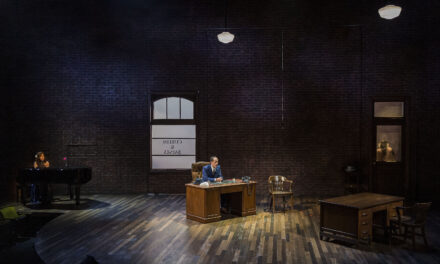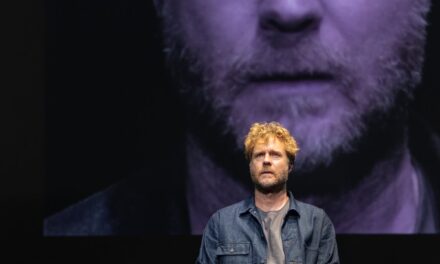There’s no curtain to create the traditional pomp and circumstance of American theatre. The stage is empty, save for a curiously eclectic ensemble, and the visible pit gives the theatre a homey sense of connectedness that is clearly purposeful. It seems like a perfect metaphor for the simplicity of a new connection; open space soon to be filled with misunderstanding, oversimplification, discovery, responsibility, and life. Miss You Like Hell opened last week, a show as effervescent and timely as one would expect from the Public Theater. A Broadway alum in her own right, Quiara Alegría Hudes (In the Heights, Water by the Spoonful) unapologetically brings her Pulitzer Prize-winning writing back to the stage in a story about connection, family, and womanhood – grounded in Mexican roots and a fearlessly millennial perspective.
Filling the stage, it’s immediately clear that Beatriz, played by Daphne Rubin-Vega (Jack Goes Boating, F**king A), is trying to gather strength to do something; and for whatever it is she’s about to attempt, she’s going to need a lot of strength. It’s a question that’s immediately and loudly answered by her daughter, Olivia, played by Gizel Jiménez (Party People, West Side Story national tour), a terrifyingly brilliant, hyper-aware, mixed-race teenager from Boston with all the self-actualization and unbridled precociousness of a sixteen-year-old. Within the first couple of minutes, we learn that these two women have a connection to mend: mother-daughter relationships are tricky even without abandonment issues to reconcile. To Beatriz, an obnoxious teenage suicide attempt warrants a seven-day cross-country trip to get and gather her daughter, and hopefully, fill in some of the parts of her identity before the space for them is lost forever. So, our trip begins at the corner of reconciliation and misunderstanding and takes us all the way to Los Angeles, where, like it or not, real life is waiting to test the strength of both these larger-than-life women.
With New York audiences it’s not altogether uncommon to witness audience members in analysis paralysis, where the audience doesn’t know how to engage with the work or justify the fundamental logic of the story. Miss You Like Hell, bookended with a prologue and an epilogue, uses blog posts as part of the storytelling structure, which delightfully justifies how we are seeing the tale. It’s easy to feel like this new musical tries to cover a lot of ground in just ninety-five minutes. The structure may not inherently call for an act break, but it could benefit from the clean lines and clear margins that an act break affords. Regardless, the “cross-country trip to heal a relationship” isn’t a revolutionary structure for storytelling, and as such is easily justified as a musical form that clearly prioritizes the integrity of the book. What’s most remarkable is that even with a focus on the book, the music suffers not all. The music, by Erin McKeown with lyrics by McKeown and Hudes, is surprising and delightful, often innovating on classic musical moments to arrive at a new angle and fresh perspective that makes numbers like “Sundays” and “Received” simply thrilling.
The theme of connectedness often outplays the theme of family, to the show’s benefit. The characters unpack how we bond with each other and our responsibility to those connections in a fresh way. As they look at family, friends, lovers, and sometimes people they just happen to meet, the two women get to interrogate who they’ve been to each other from the other’s perspective.
It’s difficult to tell stories about POC without a conversation about ancestral heritage and things passed on. Surely the most American experience for hyphenated Americans is figuring out how to negotiate and balance dual identities into an understanding of self that maintains its integrity. Olivia is no exception. The theme of womanhood stands tall throughout this production. The cross-section of Mexican-American identity and womanhood is whispered when Beatriz asks what Olivia “shakes her ass to” and is screamed when the topics of virginity and sex positivity come up. Miss You Like Hell often presents a characterization of girlhood and womanhood that requires an understanding of paradox – an idea brilliantly personified in the number “mothers,” which makes short work of a complex concept, truly speaking to the show’s own self-awareness.
The cast and creative team for this production deliver a solid performance. Gizel Jiménez is simply a star. Able to hold the stage for as long as she pleases, she plays Olivia with unbridled passion and a brave energy that completely earns the standing ovation from the audience. It’s immediately clear that this is her world and we’re just along for the ride. She’s one to keep an eye on. Filling up the Newman stage at the Public Theater is no small feat, which Jiménez does with a confidence that is astounding. Other noteworthy performances include Daphne Rubin-Vega, who grounds the entire piece in an adult earnestness that makes her universality as a mother soar. Danny Bolero plays Manny with so much love and tenderness that it’s easy to swoon. Latoya Edwards as Pearl serves as the resident scene stealer, leading the musical’s single most memorable number, “Yellowstone,” in an extra-swaggy, cooler-than-a-cucumber-but-never-a-pickle performance that left the audience collectively wondering whether we can get more of her in the sequel.
Peace and understanding are only truly reached when the main characters acknowledge that the only way to exist is to make a place in themselves for the other person. It’s an important observation of connectedness that is timelier now than ever. For Olivia and Beatriz, who live their lives at the marginalized intersection of Woman and Mexican, the reality is even more clear. Not only are they subject to a system that is fundamentally unfair, and bound to mistakes that others would be able to relegate to youthful zeal; the looming inevitability of being torn apart (by death or by obnoxious walls) can only be survived by a connection that is buried deep within both parties. The relevance of this new musical is as obvious as the reason it needs to be told. In a story about being connected and separated from the people who make you YOU, it’s easy to understand the sentiment: “Miss You Like Hell.”
Miss You Like Hell is currently running at the Public Theater through May 6, 2018.
Book & Lyrics by Quiara Alegría Hudes
Music & Lyrics by Erin McKeown
Choreography by Danny Mefford
Directed by Lear deBessonet
This post was written by the author in their personal capacity.The opinions expressed in this article are the author’s own and do not reflect the view of The Theatre Times, their staff or collaborators.
This post was written by The Theatre Times.
The views expressed here belong to the author and do not necessarily reflect our views and opinions.


















